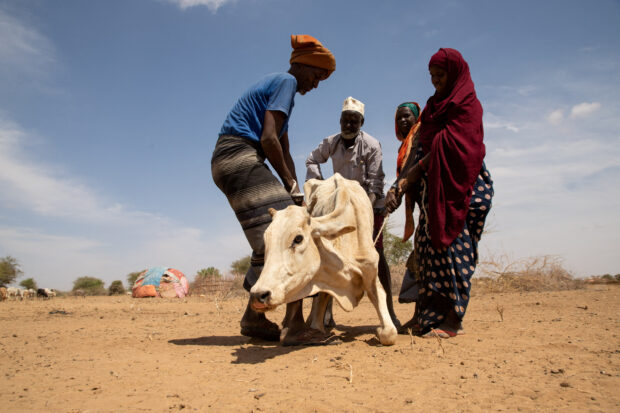Half a trillion in debt haircuts essential for sustainability – study

Residents attempt to assist a cow affected by the effects of the drought situation in Adadle district, Biyolow Kebele in Somali region of Ethiopia, in this undated handout photograph. Michael Tewelde/World Food Program/Handout via REUTERS/File photo
LONDON – Up to half a trillion dollars in debt needs to be written off to help developing nations at greatest risk of default return to sounder fiscal footing and meet climate and development goals, according to a Boston University report released on Thursday.
The haircuts on debt owed to public and private creditors by 61 of the nations that are already in or are at most risk of debt distress are essential to avoid “cascading defaults,” according to calculations from the Boston University Global Development Policy Center and the Debt Relief for a Green and Inclusive Recovery (DRGR) Project.
“Without ambitious debt relief, many of the poorest countries don’t have a chance,” said Kevin P. Gallagher, DRGR project co-chair and director of the Boston University Global Development Policy Center.
The COVID-19 pandemic, followed by food and fuel shocks in the wake of Russia’s invasion of Ukraine in 2022, put enormous strain on public finances and led to soaring borrowing costs.
At the same time, emerging market sovereign debt increased by 178 percent since the global financial crisis, rising to $3.9 trillion by 2021, the report found, and the structure of lenders became increasingly complex.
The researchers found that some $812 billion in debt across all creditor classes should be in scope for restructuring.
To achieve the best outcome, researchers proposed to include instruments that had alleviated previous emerging market debt crises.
This included a guarantee facility that would provide enhancements – or forms of guarantees – for newly issued Brady bonds focused on green and inclusive recovery which private and commercial creditors can swap with a significant haircut against old debt, the report said.
“The proposal is in many ways a modern-day version of the Brady Plan and the Highly Indebted Poor Countries (HIPC) Initiative of the 1990s combined — the last time that debt distress threatened our development goals.”
Ratings agency Fitch said there are currently a record number of sovereign debt defaults, while the International Monetary Fund said 25 percent of emerging markets and 60 percent of low-income countries are in or near debt distress.
This coincides with what experts warn is pending environmental catastrophe. The research found a correlation between debt distress and climate vulnerability; a string of debt-distressed nations, including Pakistan, Ethiopia and Malawi, have recently battled concurrent extreme weather events that intensified pressure on public finances.
The report warned that as financial markets increasingly factor climate-related risks into their assessments, it will become more expensive for those nations to borrow money – putting essential projects to cut emissions and bolster climate resilience out of reach.
READ MORE:
https://business.inquirer.net/375743/world-bank-chief-says-poorest-countries-owe-62b-on-bilateral-debt
https://business.inquirer.net/377157/imf-says-poor-countries-need-nearly-500b-in-external-financing-through-2026
